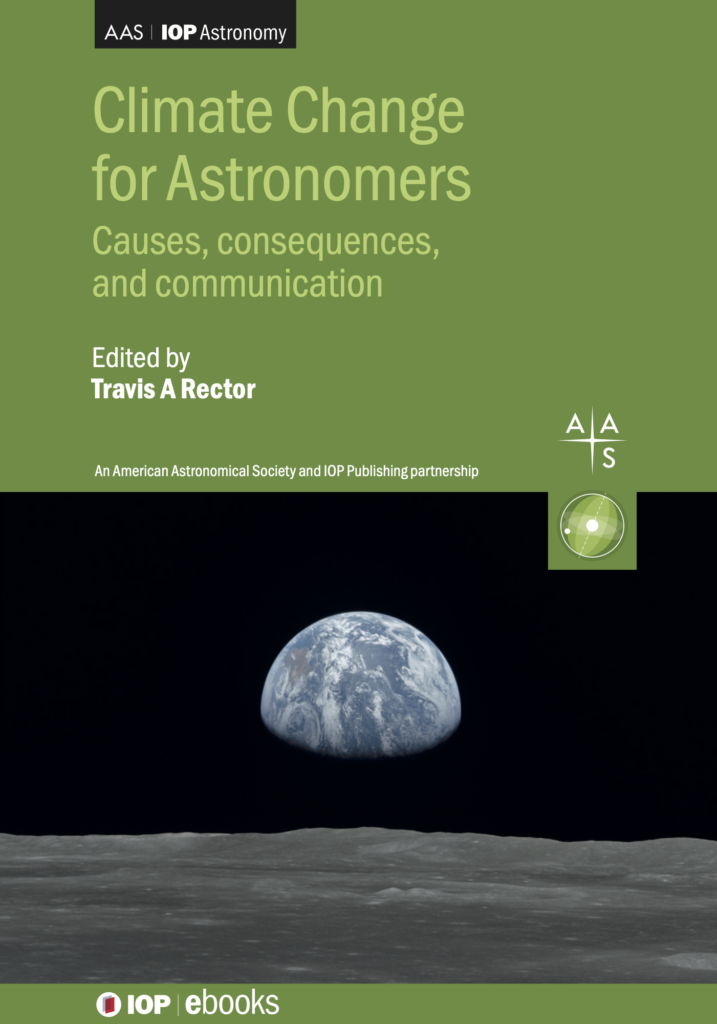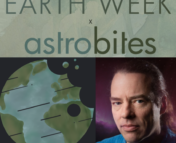A team of twenty scientists, many of whom are members of Astronomers for Planet Earth (A4E), is publishing an e-book through IOP Press titled Climate Change for Astronomers: Causes, consequences, and communication. The purpose of the book is “to help astronomers be better educators, communicators, and advocates.” This substantial effort culminating in 590 pages was led by Dr. Travis Rector, an astronomy professor at the University of Alaska Anchorage and a passionate climate activist. Dr. Rector has been involved with our annual Earth Week x Astrobites in both 2022, where he co-led one of the events, “Bringing Climate to the Classroom,” and 2023, where we spoke to him about leading the AAS Green Task Force, whose mission is to guide the AAS in their response to the climate crisis.

Today’s post serves as the first of what will be a series of chapter summaries for the forthcoming book. Here we focus on the “Preface”, “Foreword” and first chapter, “Why Astronomers?”, with special commentary from our interview with Dr. Rector on the process of writing this book.
. . .
“Preface” by Dr. Travis Rector
The preface begins with how the e-book came to be. Dr. Rector was approached by IOP Publications about writing this book in March 2020, just as the world began undergoing a profound change. The COVID-19 pandemic altered life as we know it, including astronomy. With the rise of remote observing and online conferences, astronomy began to adapt. During this time, the book also transformed. The initial idea was to create a technical resource, with chapters emphasizing the science of climate change (e.g. planetary atmospheres, radiative transfer). However, Dr. Rector realized that the issue was not that astronomers did not know enough science; “the real issue is helping astronomers be better communicators.”
Climate change communication differs from the science communication astronomers are familiar with: climate change is a much more politically charged, personal, and urgent issue than the faraway topics we research in astronomy. When we discuss climate change, we face the skepticism, denialism, misinformation, and emotions (anxiety, guilt, despair) associated with it. Dr. Rector talked about how “astronomers are used to talking about non-controversial issues where audiences are excited to hear what we have to say,” a marked contrast from what climate conversations can be like. Thus, the focus of the book shifted from being a technical text to being a resource for astronomers to improve their climate change communication to become effective advocates.
The chapters in the book cover a breadth of topics (e.g., consequences of global warming, communication strategies, energy solutions), and are written by a team of authors with varied backgrounds at the intersection of astronomy and climate change. Their involvements in environmental work range from teaching climate change in astronomy courses to completely leaving astronomy research to pursue a path in advising science policy. These experts exemplify what author Dr. Bernadette Rodgers refers to as a “spectrum of advocacy.” The hope is that as astronomers go through the e-book, they will learn to communicate, educate, and advocate better, while finding their particular role in the fight. “This book is for astronomers, by astronomers,” Dr. Rector notes.
“Foreword” by Dr. Peter Kalmus
Dr. Kalmus puts it simply: mitigating the climate crisis comes down to “[ending] the fossil fuel industry.” We already feel the adverse effects of climate change, but “it’s not too late to fight.” However, our situation will only continue to worsen at an accelerating rate. Moved by his concern about global warming, Dr. Kalmus, who started his career in gravitational wave astrophysics, felt “called to defend Earth,” and leapt into climate science. He expresses that, “people will be moved to action when astronomers are moved to action.”
He summarizes the 3 key principles to climate activism as follows:
- “Fully embrace the emotions.” Use them as fuel to guide you and others into protecting our planet. It is never too late to start.
. - “Work with other people.” We cannot do this alone. Find community and lean on them for support. Astronomers for Planet Earth is a great start, join here.
. - “Take risks.” To make great change, we must take great risks. Feel uncomfortable.
Chapter 1: “Why Astronomers?” by Dr. Travis Rector
Climate change is not in the distant future. It is happening now. But we can make a difference. How? As astronomers, we…
- …have an important perspective. When looking at Earth from outer space, astronauts experience what is called the “overview effect” where their perspective results in a greater appreciation for and understanding of the fragility of human life. As Dr. Rector notes, “people find astronomy to be humbling,” and these feelings of awe can actually be an impetus for environmentalism (see Zhao et al. 2018).
- …have an incredible reach. Astronomy classes can reach about a quarter million people at the college level, and for many students, it is their last formal science class. Afterwards, their climate education usually comes from the media, where misinformation and skepticism are rampant. Astronomy is considered a gateway science, and we can leverage our expertise by integrating climate science into our outreach efforts.
- …have technical overlap with climate science. “Though we [as astronomers] might feel reluctant in teaching climate science because it is not our area of expertise, our scientific knowledge actually has significant overlap,” Dr. Rector stresses. This will be further elaborated on in our Chapter 8 summary bite, but if you are keen, you can watch Dr. Rector talk about this in our Earth Week x Astrobites 2022 event, “Bringing Climate to the Classroom” (recording and recap here).
- …can talk about climate change more freely. Climate scientists are generally written off by deniers who claim that they have monetary incentive to exaggerate the crisis. However, as astronomers who are not talking about global warming to attract funding, we have the agency to speak out with less reluctance. For example, even in 1985, astronomer Carl Sagan testified before the United States Congress on climate change.
What’s next?
When asked what the next steps are and what the future looks like, Dr. Rector touched on astronomy’s extensive carbon footprint (Chapter 18), and emphasizes the urgent need to decrease our emissions via the three biggest contributors: observatories, supercomputing, and air travel. As the chair for the Green Task Force and member of the Future of Meetings Task Force, Dr. Rector is leading by example. He hopes this book empowers astronomers in their efforts to help protect the only planet we can call home.
Though the book’s official release is later this month (the exact date is still to be finalized), Dr. Rector has made the text available here. Be on the lookout for bites covering each of the chapters in the coming months!
Lastly, for those attending AAS 243 this week: Dr. Travis Rector is going to be leading a Special Session on “How to Teach and Talk about Climate Change” on Monday, January 8, 2024 (10:00–11:30 AM CT).
Remember, as Dr. Kalmus writes,
“The climate movement needs you [astronomers], desperately.”
Astrobite edited by Olivia R. Cooper
Featured image credit: AAS/IOP Publishing




